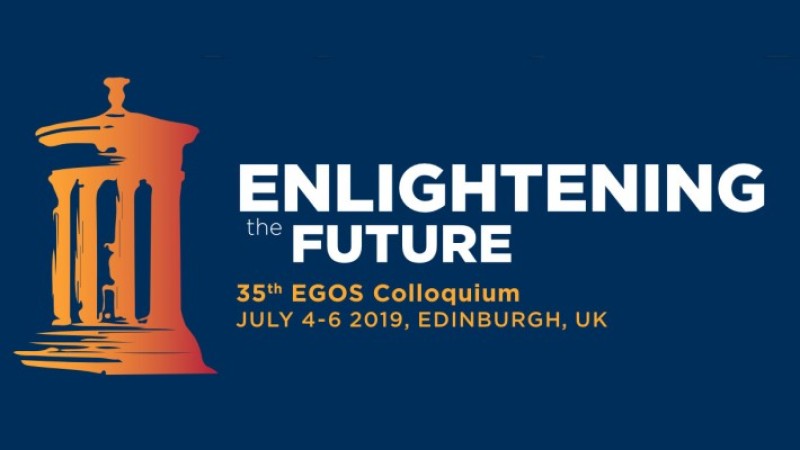Sub-theme 02: [SWG] Revealing Obscured and Emerging Issues in Organizational Responsibilities
Call for Papers
In this inaugural sub-theme of a new EGOS Standing Work Group (SWG) on “Organizing
Social Responsibilities in Contested Times”, we aim to study new and previously ‘hidden’ social issues that appear on
the radar of organizational researchers and, despite their magnitude, have only recently been picked up and investigated from
an organizational perspective. This focus chimes with this year’s Colloquium theme: Enlightening the Future. The
key problem we face is how to organize and divide responsibilities between societal actors when new issues emerge. To do this
we need to enlighten ourselves toward new understandings and new insights on organizational responsibilities in 2019 and beyond.
New issues include, for instance, modern forms of slavery (Crane, 2013), big data, new technologies and artificial
intelligence usage by organizations (Colbert et al. 2016; Flyverbom et al., 2017), mental health and wellbeing (Cedertröm
& Spicer, 2015), organizational impacts on and of gender inequality (Grosser & Moon, 2017; McCarthy, 2017), and income
inequality (Bapuji, 2015). From exciting developments in circular economies (Stahel, 2016) and worrying trends in gig economies
(Fleming, 2017), there are also many emerging social and environmental problems under the umbrella of the United Nations Sustainable
Development Goals (Howard-Grenville et al., 2017). Recent protectionist political and economic trends, de-legitimation of
media at the national level, and broader changes in the global governance landscape only add to the contestation of taking,
assigning and ignoring organizational responsibilities.
These fast-changing and unpredictable trends, issues and
events (Moon et al., 2017; Pisani et al., 2017) present new problems for organizations. Whilst some of these issues are new,
brought about by advances in technology, for example, others are longstanding problems that have been ‘obfuscated’ (Spence,
2016). We therefore seek to put those new and ‘hidden’ issues on the agenda of organizational research to enable a more systematic
assessment of how these issues reflect organizational practices and how organizational responsibilities for the issues might
be delineated and theorized (Davis, 2015).
Possible questions include, but are not limited to:
Which social issues have previously been hidden or ignored by organizational scholars and how do these support organization theory development?
How are responsibilities divided amongst different societal actors, and how are power relations manifested as new issues emerge?
How are organizational responsibilities assigned or adopted similarly or differently across different issues?
How do recent developments in the political and media landscape affect organizational responsibilities?
What role does technology play in the adoption or assignment of organizational responsibilities?
References
- Bapuji, H. (2015): “Individuals, interactions and institutions: How economic inequality affects organizations.” Human Relations, 68 (7), 1059–1083.
- Colbert, A., Yee, N., & George, G. (2016): “The digital workforce and the workplace of the future.” Academy of Management Journal, 59 (3), 731–739.
- Cedertröm, C., & Spicer, A. (2015): The Wellness Syndrome. Oxford: Wiley.
- Crane, A. (2013): “Modern slavery as a management practice: Exploring the conditions and capabilities for human exploitation.” Academy of Management Review, 38 (1), 49–69.
- Davis, G.F. (2015): “Celebrating organization theory: The after-party.” Journal of Management Studies, 52 (2), 309–319.
- Fleming, P. (2017): “The human capital hoax: Work, debt and insecurity in the era of Uberization.” Organization Studies, 38 (5), 691–709.
- Flyverbom, M., Deibert, R., & Matten, D. (2017): “The Governance of Digital Technology, Big Data, and the Internet: New Roles and Responsibilities for Business.” Business & Society, available at: http://journals.sagepub.com/doi/abs/10.1177/0007650317727540
- Grosser, K., & Moon, J. (2017): “CSR and feminist organization studies: Towards an integrated theorization for the analysis of gender issues.” Journal of Business Ethics, 1–22, https://link.springer.com/article/10.1007%2Fs10551-017-3510-x.
- Howard-Grenville, J., Davis, J., Dyllick, T., Joshi, A., Miller, C., Thau, S., & Tsui, A.S. (2017): Special issue Call for Submissions: “Sustainable Development for a Better World: Contributions of Leadership, Management and Organizations”. Academy of Management Discoveries, 3 (1), 106–109.
- McCarthy, L. (2017): “Empowering women through corporate social responsibility: A feminist Foucauldian critique.” Business Ethics Quarterly, 27 (4), 603–631.
- Moon, J., Murphy, L., & Gond, J.P. (2017): “Historical Perspectives on Corporate Social Responsibility.” In: A. Rasche, M. Morsing & J. Moon (eds.): Corporate Social Responsibility: Strategy, Communication, Governance. Cambridge, UK: Cambridge University Press, 31–62.
- Pisani, N., Kourula, A., Kolk, A., & Meijer, R. (2017): „How global is international CSR research? Insights and recommendations from a systematic review.” Journal of World Business, 52 (5), 591–614.
- Spence, L.J. (2016): “The obfuscation of gender and feminism in CSR research and the academic community.” In: K. Grosser, L. McCarthy & M.K. Kilgour (eds.): Gender Equality and Responsible Business: Expanding CSR Horizons. Saltaire, UK: Routledge/Greenleaf.
- Stahel, W.R. (2016): “Circular economy.” Nature, 531, 435–438.


